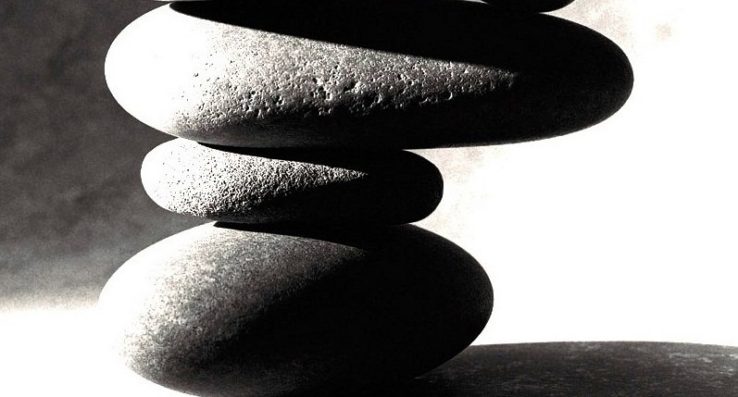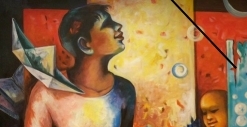It’s tempting to reply with some absolute answer like “no one”, “only yourself” or “God”, depending on your beliefs, but I think that honest reply requires going deeper.
“To be able to depend on someone” as I understand it, is to have the belief that someone or something will “be there for you”, when you need them. This is a belief, not a fact, which means that this is something that is part of your mind – much more than an objective reality. But of course your beliefs are formed in response to whatever life “has taught you”.
For example, I have warm, loving parents, that despite many conflicts that we had over the years, have imprinted in me a kind of belief that I can rely on their support, if I need it. But I know people for whom parents are a constant source of grievance and disappointment, and they obviously don’t have this belief that they can depend on their parents. Other people, who have been let-down multiple times by different people in their lives develop a strong belief that you can depend on no-one, and you must survive by yourself.
Regardless of what life has imprinted in you, I think we should strive for a certain mind-set that is beneficial for successful and happy life. And it entails two things: openness to vulnerability and interdependence:
- Openness to vulnerability means that we accept our vulnerability, and stop viewing it as a weakness. This enables us to develop intimacy and deep, satisfying relationships.
- Interdependence means that we have a certain maturity regarding our place in the world. This means that we are responsible for own life, not blaming others for our actions and decisions, and being independent in our thinking. But in the same time, we realize that by joining other people, we can achieve so much more: joy and happiness by sharing love with our partner, realization of creative projects by sharing ideas with colleagues, changing society by forging solidarity with fellow citizens.
So in the end, the question of “whom you can depend on”, should be transformed to “are you willing to stand on you own, but knowing also that you have to rely on others to achieve bigger things?” And you might be let-down, and you might be disappointed. But these obstacles are part of the way, and they eventually may help you grow and develop into the only person you need to become: yourself



I just started reading a very wonderful book called The Dark Side of Love by Jane G. Goldberg.
I read a lot about love, because I didn’t have warm, loving parents. I always get tripped up by my own confusion as to what intimacy and interdependence entails and I move between wanting intimacy and needing freedom. I’ve been looking for guidance to help me out with that.
My mother was divorced my father by the time I was 2 and remarried by the time I was 5. Both of her husbands were alcoholics. My mother was narcissistic and very demanding and demeaning to those closest to her. This made for some really tough early lessons.
Despite my upbringing, I am a very loving, very caring person, but I carry scars from that early imprinting and that has interfered with the flow of that love.
My husband, while very generous with his love and affection and kindness, and helped me trust and depend on him, also had a binge drinking problem as well.
It is kind of true that adult children of alcoholics tend to become co-dependent with their spouses. I was, a little, though I did a few things to try and separate from his issues. I did what I could to protect myself from getting hurt. Over the years…this grew into a gulf, at least emotionally. We managed to maintain physical intimacy, but as far as emotional intimacy goes, I hardly knew my husband. Many times, he shut down his communication, no matter how much I tried to get him to talk to me about what was going on in his mind and heart.
I have had a great deal of difficulty reconciling the different aspects of him. My husband was really loving when he was sober (which was most of the time) AND really hurtful when he was drunk (which was about 3-4 times a year in these binge drinking episodes). It was like living with Dr. Jekyll and Mr. Hyde. Then again, I had my own version of Dr. Jekyll/Ms. Hyde too as I struggled to cope with my anger at the mistreatment.
I tried to turn to my mother and one of my close friends who had a bad drinking habit once upon a time. Both sources were not very helpful. They both found reasons to minimized the problem and they really had no idea how to help.
Eventually I came across Healing the Shame that Binds You that hit home for him. And The Dark Side of Love has hit home for me.
One of the things I learned from the book that I didn’t realize about love is that it’s actually very mature to feel and express (in healthy ways) all the disappointments, hurts, anger, and jealousy that accompanies love. Immature love only knows the positive feelings, so when the negative feelings arise, people think the love has died. It hasn’t. It just gets hidden.
Mature love accepts ALL the negative feelings too. That book was one of the very first that taught me that real love can’t exist without hate. That to love a person in a wholly integrated way means you have to acknowledge and constructively address your feelings of hate for the person. To be fully human means to have qualities we cherish and some really hurtful aspects. Hating those hurtful aspects in another and conveying those human feelings of hate in a constructive manner is actually the first step in reducing the power of that hate. Most people have been taught that feelings of hate are wrong and evil, so they end up stuffing them, but they have a way of interfering with love anyway. Or making one ill either physically or mentally.
In order for a person to be fully capable of love, one must learn to manage our natural feelings of hate (not stuff them or disown them) and let them out in constructive ways.
Wow, what a liberating concept. And it only took me 17 years of being in relationship to find this out. My husband and I have had some really tough times over the years…and many times we were sorely lacking in faith that we could figure this out.
We both needed lessons in expressing our negative feelings for each other in constructive ways and lessons in being able to actually HEAR those messages without defensiveness. Both are very tough if you’d never been taught constructive communication skills to begin with.
It’s been some really, really phenomenal growth. I know for sure I wish I could share what I’ve learned with my family. But they aren’t receptive to hearing me just yet. And that’s okay. I’m a little sad, but I’m okay with it for the most part.
Have a great night,
Casey